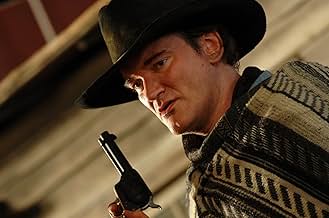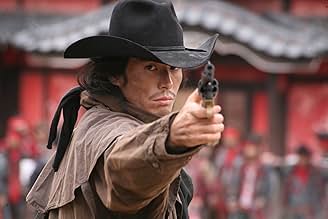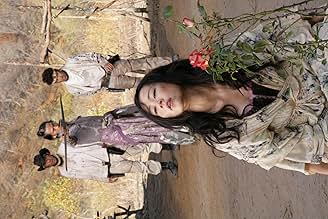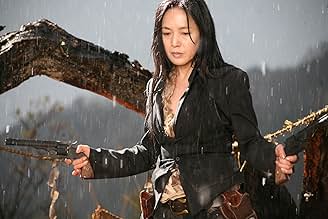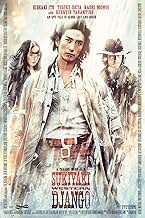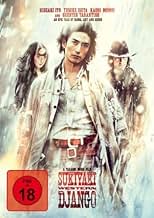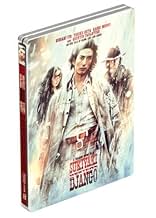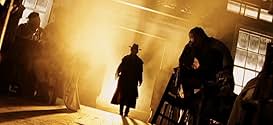CALIFICACIÓN DE IMDb
6.1/10
16 k
TU CALIFICACIÓN
Un pistolero sin nombre llega a un pueblo destrozado por pandillas rivales y, aunque ambas lo cortejan para que se una, elige su propio camino.Un pistolero sin nombre llega a un pueblo destrozado por pandillas rivales y, aunque ambas lo cortejan para que se una, elige su propio camino.Un pistolero sin nombre llega a un pueblo destrozado por pandillas rivales y, aunque ambas lo cortejan para que se una, elige su propio camino.
- Dirección
- Guionistas
- Elenco
- Premios
- 4 premios ganados y 5 nominaciones en total
- Dirección
- Guionistas
- Todo el elenco y el equipo
- Producción, taquilla y más en IMDbPro
Opiniones destacadas
Sometimes a film presents itself to you as a character, whole in definition, with whom you have to deal. This is possible either because the film has a soul that the artist has created, or because the filmmaker borrows one by hijacking a genre. That is what Miike has done here. Though some of his other experiments sit well with me, this does not.
Dealing with such a character is not a simple emotional (and sometimes intellectual) transaction. Sometimes it is a struggle, a contest where each party wants to pull the other into their own world. Even these than be worthwhile, but the chances go way down; motives get questioned, selves get examined when you have to struggle.
I saw this together with 'Rango.' Same strategy, and even many of the same references. But as thin as Rango was, it presented a worthy character. Whether you choose to argue or even try to win is up to you. But at least you should choose your encounters wisely.
Ted's Evaluation -- 1 of 3: You can find something better to do with this part of your life.
Dealing with such a character is not a simple emotional (and sometimes intellectual) transaction. Sometimes it is a struggle, a contest where each party wants to pull the other into their own world. Even these than be worthwhile, but the chances go way down; motives get questioned, selves get examined when you have to struggle.
I saw this together with 'Rango.' Same strategy, and even many of the same references. But as thin as Rango was, it presented a worthy character. Whether you choose to argue or even try to win is up to you. But at least you should choose your encounters wisely.
Ted's Evaluation -- 1 of 3: You can find something better to do with this part of your life.
Sukiyaki Western Django (2007)
** (out of 4)
Quentin Tarantino in a Takashi Miike homage to Spaghetti Westerns is going to be enough to get a few curious people to watch but I must rip off a few reviews I've read, which called this film different but not very entertaining. In what's basically a remake of Akira Kurosawa's Yojimbo, a mysterious gunfighter (Ito Hideaki) with no name shows up and plays two rival gangs against one another. If someone was to call this the greatest movie ever made I honestly wouldn't argue with them. I'm sure many are going to watch this film and consider it a masterpiece and I would respect their opinion just about as much as I respect Miike for trying something like this. However, the movie just didn't work for me. This is basically an incredibly bizarre homage to countless Westerns done in a way that Tarantino pays homage to various genres in this country but I might go a step further and say Miike is much more original than Tarantino has ever been. I think this film, for what it is, is incredibly original and at times visually brilliant but as much credit as I give to Miike I have to give him just as much blame. For some reason he felt it would be a good idea to have the Japanese actors speak English, which was a deadly mistake. Sure, this adds a surreal nature to the film but the problem is that a lot of the times you can't understand what they're saying. This film is full of dialogue and when you can't understand a quarter of it then you're going to be in trouble. This also effects the performances as the spoken dialogue is just as bad as watching a dubbed Kurosawa film. As is to be expected, the movie is full of violence but most of it is done in a comical way and that includes one man getting shot up while his wife holds his dying body. Tarantino doesn't add too much to the film either. In the end this is a film I highly respect but there's just no way I will ever find myself watching it again.
** (out of 4)
Quentin Tarantino in a Takashi Miike homage to Spaghetti Westerns is going to be enough to get a few curious people to watch but I must rip off a few reviews I've read, which called this film different but not very entertaining. In what's basically a remake of Akira Kurosawa's Yojimbo, a mysterious gunfighter (Ito Hideaki) with no name shows up and plays two rival gangs against one another. If someone was to call this the greatest movie ever made I honestly wouldn't argue with them. I'm sure many are going to watch this film and consider it a masterpiece and I would respect their opinion just about as much as I respect Miike for trying something like this. However, the movie just didn't work for me. This is basically an incredibly bizarre homage to countless Westerns done in a way that Tarantino pays homage to various genres in this country but I might go a step further and say Miike is much more original than Tarantino has ever been. I think this film, for what it is, is incredibly original and at times visually brilliant but as much credit as I give to Miike I have to give him just as much blame. For some reason he felt it would be a good idea to have the Japanese actors speak English, which was a deadly mistake. Sure, this adds a surreal nature to the film but the problem is that a lot of the times you can't understand what they're saying. This film is full of dialogue and when you can't understand a quarter of it then you're going to be in trouble. This also effects the performances as the spoken dialogue is just as bad as watching a dubbed Kurosawa film. As is to be expected, the movie is full of violence but most of it is done in a comical way and that includes one man getting shot up while his wife holds his dying body. Tarantino doesn't add too much to the film either. In the end this is a film I highly respect but there's just no way I will ever find myself watching it again.
A strange movie, I must say. But before I go into the movie itself, I feel the need to talk about the case.
That's why I actually bought this movie, originally. Because the case was so...pretty. And Quentin Tarantino's name on it sealed the deal for me. The cover design is so well done and beautiful and artistic and many other synonyms of those, which provides the perfect segue into the movie itself.
It starts out with, of all people, Quentin Tarantino. The background is noticeably fake, a setting sun over the horizon painted onto a backdrop. I was a bit taken aback, at first, and I never really understood why, but I rolled with it. With the first words spoken, however, it became painfully apparent what this movies main problem would be.
You see, despite the fact that almost all of the cast uses Japanese as their primary language (I haven't verified this, but it's pretty obvious), the filmmaker, Takashi Miike, shot the whole thing in English. Thankfully, there are subtitles, but the lack of understandable speech presents a great barrier. It's basically the story of two clans, the Heike, led by Kiyomori/Henry (Kōichi Satō), and the Genji, led by Yoshitsune (Yūsuke Iseya), that are battling over a town for a fabled treasure. A mysterious stranger (Hideaki Ito) rolls into town, much like Clint Eastwood in those old movies that we love oh-so-much. This is a beautifully done movie, with many breathtaking scenes, exciting, lovable characters (for the most part), and plenty of blood and gore. Oh, and a rape, so keep the kiddies away from this one.
That's why I actually bought this movie, originally. Because the case was so...pretty. And Quentin Tarantino's name on it sealed the deal for me. The cover design is so well done and beautiful and artistic and many other synonyms of those, which provides the perfect segue into the movie itself.
It starts out with, of all people, Quentin Tarantino. The background is noticeably fake, a setting sun over the horizon painted onto a backdrop. I was a bit taken aback, at first, and I never really understood why, but I rolled with it. With the first words spoken, however, it became painfully apparent what this movies main problem would be.
You see, despite the fact that almost all of the cast uses Japanese as their primary language (I haven't verified this, but it's pretty obvious), the filmmaker, Takashi Miike, shot the whole thing in English. Thankfully, there are subtitles, but the lack of understandable speech presents a great barrier. It's basically the story of two clans, the Heike, led by Kiyomori/Henry (Kōichi Satō), and the Genji, led by Yoshitsune (Yūsuke Iseya), that are battling over a town for a fabled treasure. A mysterious stranger (Hideaki Ito) rolls into town, much like Clint Eastwood in those old movies that we love oh-so-much. This is a beautifully done movie, with many breathtaking scenes, exciting, lovable characters (for the most part), and plenty of blood and gore. Oh, and a rape, so keep the kiddies away from this one.
Reading some of the reviews, I am surprise that others are confused as to the story. It is basically a samurai movie made as a Japanese western with Japanese cowboys instead of samurais. The story is almost the same as Yojimbo/A Fistfull of dollars. Stranger comes into town and gets the 2 opposing gangs to start killing each other. The difference being he has a sidekick in the kick ass Bloody Benten (female gunslinger). I think what makes everyone go "huh?" is its rather confusing opening with Quentin Tarantino and also the dialogue in heavily Japanese accented and enunciated English. It is rather jarring and does distract from the story. However if you have watched enough undubbed samurai movies you will be familiar with the style and delivery of the dialogue so the distraction goes away. The movie is nothing original but based on it simply being a gunfight movie its not bad.
The line between Japanese samurai films and Italian Westerns (called "spaghetti" in the West and "macaroni" in the East) has been blurry from the days of Akira Kurosawa and Sergio Leone. The widescreen expanses of 19th Century lawlessness was a cinematic language easily translated between chambara and Euro oaters.
Prolific filmmaker Takashi Miike forgoes the pasta and dubs his dabbling in the horse opera a "sukiyaki" western. This Japanese stew-like metaphor is appropriate as Miike throws in a great number of influences and references into his dish. What cooks up may bear the name "Django" (and he introduces a coffin hiding a machine gun midway through the film) but it owes more to Kurosawa than Corbucci in its acknowledged inspiration from YOJIMBO. The unnamed black clad antihero rides into a previously thriving town to find it a wretched hive of scum and villainy; occupied by a handful of citizens and two warring clans, the Genji and Heike.
Clad in red and white, Miike injects some heavy duty rose overtones into the film, calling out the War of the Roses, Henry VI, and a hybrid rose bush named "love" quite frequently. At least two of the film's characters are products of Genji (red) and Heike (white) love affairs.
Even with a wealth of past ideas to pilfer, SUKIYAKI WESTERN DJANGO can't sustain itself for its full two hour running time. Things slow down about an hour into the proceedings. In order to inject some life into the faltering action, Miike breaks into the cartoon sound effects library and attempts to make SWD a life action anime film. These instances feel completely out of place, even after the highly stylized pre-credit sequence starring living cartoon character Quentin Tarantino.
It's strange with actors speaking English as a second language (for the most part) and who muddle through some tricky pronunciations (thank goodness for the English subtitles) that the worst performance of the film comes courtesy of a native English speaker. Quentin Tarantino seems to be doing some kind of Western drawl crossed with a fluctuating German accept as if channeling a drunk Klaus Kinski through a faulty connection. Tarantino's embarrassing "acting" may be brief but every second he spends on screen is excruciating.
Sure to be a hit with every hipster who has never seen an Asian in a cowboy hat (allow me to recommend TEARS OF THE BLACK TIGER and THE NEW MORNING OF BILLY THE KID), SUKIYAKI WESTERN DJANGO could do with some tightening up and a complete Tarantino-echtomy.
Prolific filmmaker Takashi Miike forgoes the pasta and dubs his dabbling in the horse opera a "sukiyaki" western. This Japanese stew-like metaphor is appropriate as Miike throws in a great number of influences and references into his dish. What cooks up may bear the name "Django" (and he introduces a coffin hiding a machine gun midway through the film) but it owes more to Kurosawa than Corbucci in its acknowledged inspiration from YOJIMBO. The unnamed black clad antihero rides into a previously thriving town to find it a wretched hive of scum and villainy; occupied by a handful of citizens and two warring clans, the Genji and Heike.
Clad in red and white, Miike injects some heavy duty rose overtones into the film, calling out the War of the Roses, Henry VI, and a hybrid rose bush named "love" quite frequently. At least two of the film's characters are products of Genji (red) and Heike (white) love affairs.
Even with a wealth of past ideas to pilfer, SUKIYAKI WESTERN DJANGO can't sustain itself for its full two hour running time. Things slow down about an hour into the proceedings. In order to inject some life into the faltering action, Miike breaks into the cartoon sound effects library and attempts to make SWD a life action anime film. These instances feel completely out of place, even after the highly stylized pre-credit sequence starring living cartoon character Quentin Tarantino.
It's strange with actors speaking English as a second language (for the most part) and who muddle through some tricky pronunciations (thank goodness for the English subtitles) that the worst performance of the film comes courtesy of a native English speaker. Quentin Tarantino seems to be doing some kind of Western drawl crossed with a fluctuating German accept as if channeling a drunk Klaus Kinski through a faulty connection. Tarantino's embarrassing "acting" may be brief but every second he spends on screen is excruciating.
Sure to be a hit with every hipster who has never seen an Asian in a cowboy hat (allow me to recommend TEARS OF THE BLACK TIGER and THE NEW MORNING OF BILLY THE KID), SUKIYAKI WESTERN DJANGO could do with some tightening up and a complete Tarantino-echtomy.
¿Sabías que…?
- TriviaThe background for the artificial set in the prologue is clearly inspired by the woodblock prints "Gaifu Kaisei" and "Sanka Haku" featured in Hokusai's famous "Thirty Six Views of Mount Fuji" series.
- ErroresIn the final scene, the Gunman goes from having a mustache and goatee to being clean shaven between shots.
- Versiones alternativasThe international cut version, shorter by 23 minutes, omits several scenes for pacing reasons and also all the scenes where the big Genji/Minamoto henchman after having his balls shot off develops a crush for his leader Yoshitsune. This version was screened at several film festivals and is featured on most of the DVD releases outside of Japan.
- ConexionesReferenced in Film Junk Podcast: Episode 194: Quantum of Solace (2008)
- Bandas sonorasDjango ~Sasurai~
Performed by Saburô Kitajima
Written by Makoto (as MAKOTO°), Franco Migliacci and Robert Mellin
Composed by Luis Bacalov (as Luis Enrique Bacalov)
Arranged by Eiji Kawamura
Selecciones populares
Inicia sesión para calificar y agrega a la lista de videos para obtener recomendaciones personalizadas
Detalles
Taquilla
- Presupuesto
- USD 3,800,000 (estimado)
- Total en EE. UU. y Canadá
- USD 50,659
- Fin de semana de estreno en EE. UU. y Canadá
- USD 9,856
- 31 ago 2008
- Total a nivel mundial
- USD 2,725,258
- Tiempo de ejecución2 horas 1 minuto
- Color
- Mezcla de sonido
- Relación de aspecto
- 2.35 : 1
Contribuir a esta página
Sugiere una edición o agrega el contenido que falta

Principales brechas de datos
By what name was Sukiyaki uesutan Jango (2007) officially released in India in English?
Responda






